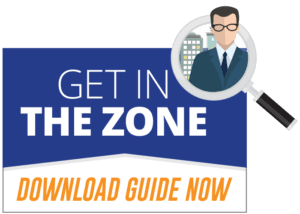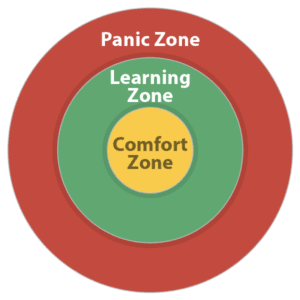How do you bounce back from failure? The way to overcome setbacks is to adopt a positive mindset and move forward.
Mindset Matters:
What you believe matters. Have you ever thought about how your beliefs impact your success as a leader? Imagine you’ve set a goal for yourself to become promoted within the next year. You’re excited about the thought of leading others, taking on additional responsibilities and being compensated for this promotion. You even have the job title in mind and a list of things you need to accomplish in order to show you’re the best candidate for the job. You are on the right path to achieve your goal.
But before you imagine moving into your new office, stop and answer this question: do you truly believe you can make this happen? Be honest.
If the answer to this question is not an immediate and empathetic yes, then you have some work to do. In order to achieve your goal, you need to cultivate a can-do spirit in yourself. It’s critical that this happens before you move on to the nuts and bolts of getting things done, because no one has ever accomplished big things by starting with the attitude, “I can give it a try, but it’s probably not going to happen.”
I always say that in order to succeed, you have to be able to picture where you want to be and believe you can get there. It’s a two-part process. And both parts are equally important. Why is this important? It’s because you become what you think you are.
 Sometimes the best way to discover “how” to do something new is by learning from those who are already successful, and Rory McIlroy is a shining example of choosing to believe the best and understanding the importance of always growing so he can get better and better.
Sometimes the best way to discover “how” to do something new is by learning from those who are already successful, and Rory McIlroy is a shining example of choosing to believe the best and understanding the importance of always growing so he can get better and better.
I recently had the wonderful opportunity to speak with Rory two weeks before his phenomenal win at the Arnold Palmer Invitational. He role models positive thinking; no wonder he has spent 95 weeks ranked #1 golfer in the world and has joined the illustrious company of Jack Nicklaus and Tiger Woods as the world’s only three golfers to have won four Major titles by the age of 25.
Listen to Both Parts of David’s conversation with Rory. Start with Part 1!
Rory is what I call the real deal. He possesses leadership qualities I admire: humility, authenticity, and vulnerability, while at the same time being extremely driven. He believes in leading by example and practicing what you preach. He says you don’t want to lead by fear; instead you want to make the people you lead feel a part of things.
That’s a positive mindset in motion.
But we’re all human after all. Rory revealed a time in his life where he didn’t have the right mindset and how he learned from it.
In the 2011 Masters, Rory was winning the tournament and it appeared he would easily become the champion. And then hole 10 happened. The drive was a little to the left and landed in an awful spot. This drive was a major setback and changed the course of Rory’s game. He ended up losing a four-stroke lead going into the final round; and ultimately, he didn’t win the title.
Rather than letting this setback haunt him and cause him to question his abilities, Rory chose to look at it as a learning opportunity. And today, Rory describes that round at Augusta as the most important round in his life.
The positive mindset didn’t happen right away. At the time, Rory knew it was a failure and that chances like this, to win the coveted Masters green jacket, don’t come along very often. He felt embarrassed and distraught. But rather than let this define him, Rory decided to learn from the experience. He started by watching a tape of that round, and he discovered something important. Even before his 10th hole drive, his body language through the first nine holes was negative. He walked around with his head down and his shoulders rounded. He spent a lot of time watching what others were doing rather than focusing on what he could do to win. Rory learned that next time, he needed to focus on what HE could do and control the things HE could control. So, he took this awareness to heart and committed to doing things differently in his next tournament.
Two months later, Rory came back with a bang! He not only won the US Open, but he also won it with the lowest score in US Open history. How’s that for a turnaround? His driving motivation was to prove to himself that he wasn’t the golfer the world saw in Augusta. Rory refused to be defined by the outcome of that tournament. He decided to grasp the next tournament with both hands and when he walked out on the US Open course, he was a completely different person. Rory chose to walk around with his head held high and his chest out. He kept his eye line above the crowd. His body language exuded confidence. He kept his thoughts positive. And he won.
The lesson here? Rory truly believed he could make a change, and that made all the difference.
The year 2017 was tough for Rory with injuries and not winning any tournament. When I asked Rory about this, he once again chose to believe the best about himself. He acknowledged the reality that golf is very competitive right now, but he sees himself in there. And even though he hasn’t won a tournament since 2016, he’s had 8 top fives and three seconds, so he knows a win is not too far away.
And I was most impressed with his answer to this question: Do you have any fears about winning? His immediate response was: “No, not at all. I know that if I play anywhere near my best, in any given week, I have a chance to win… And once you’re there, you have to grasp it with both hands and hit the shots that matter. I have no doubt if I get myself in that position, the win won’t be too far away.” And sure enough, Rory won the Arnold Palmer Invitational two weeks later and I’m confident he can’t wait to give the 2018 Masters his best shot too.
I have so much respect for Rory’s positive mindset and his humility to learn and grow. No wonder he’s such a successful golfer with a bright future ahead of him!
You have the power choose a positive mindset and believe change is possible too, just like Rory. It’s not always the easy path; it takes awareness, determination, and maybe even inviting someone to hold you accountable. But it’s worth it! What is one way you can think positive and choose to believe this week? Don’t miss this opportunity to make a positive change in your life, because as Norman Vincent Peale says, “Change your thoughts and you change your world.”
















 Understanding the Learning Zone
Understanding the Learning Zone 








